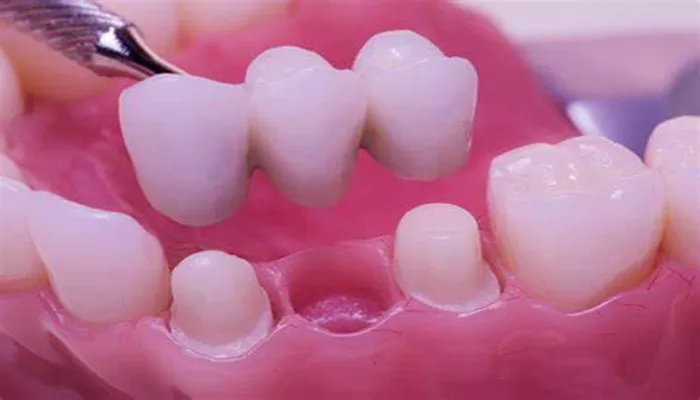Tooth loss is a common issue that can significantly impact both the functionality and aesthetics of a person’s smile. When faced with this situation, individuals often consider two primary options for tooth replacement: dental bridges and dental implants. Each solution has its benefits and drawbacks, making it essential to understand their differences to make an informed decision. This article will explore the key aspects of dental bridges and implants, helping you determine which option might be better suited for your needs.
What Is Dental Bridges?
A dental bridge is a prosthetic device used to replace one or more missing teeth by anchoring to adjacent natural teeth. The procedure involves creating crowns for the teeth on either side of the gap, which support a false tooth (pontic) in between.
Pros of Dental Bridges
Cost-Effective: Generally, dental bridges are less expensive than implants, making them a more budget-friendly option upfront.
Fewer Visits Required: The process typically requires only two visits to the dentist, making it quicker than implants.
Insurance Coverage: Many dental insurance plans cover bridges, reducing out-of-pocket expenses for patients.
No Surgery Needed: Bridges do not require invasive surgical procedures, making them suitable for individuals who may not be candidates for surgery.
see also: How Much Does A Dental Implant Cost in Sweden?
Cons of Dental Bridges
Impact on Adjacent Teeth: The procedure requires altering the adjacent healthy teeth to support the bridge, which can weaken them over time.
Limited Lifespan: Bridges usually last between 5 to 15 years before needing replacement, depending on care and usage.
Risk of Decay: Surrounding teeth may be more susceptible to decay due to the bridge’s placement and maintenance challenges.
Bone Loss: Bridges do not stimulate the jawbone, which can lead to bone loss in the area of the missing tooth.
What Is Dental Implants?
A dental implant consists of a titanium post surgically placed into the jawbone, serving as a replacement root for a missing tooth. After healing, a crown is attached to this post, providing a functional and aesthetic solution.
Pros of Dental Implants
Longevity: With proper care, dental implants can last a lifetime, making them a more permanent solution compared to bridges.
Natural Appearance and Functionality: Implants look and function like natural teeth, providing a seamless integration into your smile.
Jawbone Preservation: Implants stimulate the jawbone similarly to natural tooth roots, preventing bone loss and maintaining facial structure.
No Damage to Adjacent Teeth: Unlike bridges, implants do not require modification of surrounding healthy teeth.
Cons of Dental Implants
Higher Initial Cost: Implants are generally more expensive upfront than bridges due to surgical costs.
Longer Treatment Time: The process can take several months from consultation to completion due to healing periods required after surgery.
Surgical Risks: As with any surgical procedure, there are risks involved, including infection or complications during placement.
Not Suitable for Everyone: Candidates must have sufficient bone density in the jaw; otherwise, bone grafting may be necessary before placement.
Key Factors for Consideration
When deciding between dental bridges and implants, several factors should be considered:
1. Cost
While dental bridges are typically less expensive upfront (ranging from ₹25,000 to ₹50,000 per tooth in India), they may incur additional costs over time due to replacements every few years. In contrast, dental implants cost between ₹25,000 and ₹60,000 but offer longevity that can justify the initial investment over time.
2. Oral Health
The condition of your surrounding teeth plays a critical role in determining which option is best. Healthy adjacent teeth may support a bridge effectively; however, if these teeth have decay or damage, an implant may be preferable since it does not rely on them for support.
3. Bone Density
Dental implants require adequate bone density for successful placement. If bone loss has occurred due to missing teeth, a bone graft may be necessary before implant surgery. Conversely, bridges do not have such requirements.
4. Aesthetic Preferences
Both options can provide natural-looking results; however, many patients find that implants offer superior aesthetics due to their ability to mimic natural tooth roots and their seamless integration into the mouth.
5. Maintenance and Care
Dental implants typically require similar care as natural teeth—regular brushing and flossing—without special considerations for decay since they cannot rot. Bridges require careful cleaning around the supporting crowns to prevent decay in adjacent teeth.
Conclusion
Choosing between dental bridges and implants ultimately depends on individual circumstances including budget constraints, oral health status, aesthetic desires, and personal preferences regarding treatment duration and invasiveness.
For thoseseeking a long-term solution that preserves jaw health and does not compromise surrounding teeth, dental implants emerge as the superior choice. However, if immediate cost savings and less invasive procedures are priorities, dental bridges may be more appealing.
Related topics:

